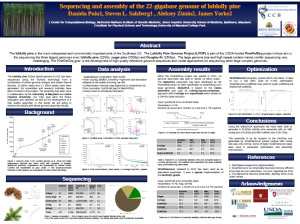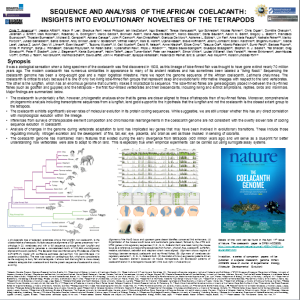
#bog13 Posters on Pine and Coelacanth
We decided to post on talks and posters from Biology of Genome 2013 meeting for our readers, who could not attend the meeting at CSHL. The process has been quite time consuming, because neither Cold Spring Harbor Lab nor conference organizers posted abstracts and detailed list of authors online. So, we have to Google the first name of only author, find his email address and then request him personally to get a copy of her slides or posters.
One request was rejected with the excuse that our blog is not ‘neutral’. The snub is likely related to our reporting of ENCODE hype. The characterization is odd, because we try to be as neutral as science allows us to be, and never distorted a scientific analysis that is convincingly correct. Unfortunately science itself is quite brutal to bad theories. In fact, science can be described as extremely biased by contemporary media (think CNN Crossfire), because it does not place an evolution pundit and and intelligent design pundit on the same podium and let them ‘debate’ on the issues.
That aside, we received few slides and posters and will continue to post them in the coming days.
Loblolly Pine
It is quite an odd day to keep switching between longest sequenced plant genome (22 Gb) and smallest one (82Mb). Earlier we wrote about Steven Salzberg’s talk on genome assembly of loblolly pine. Daniela Puiu from John Hopkins university sent us the associated poster that our readers may find informative.
In it, their group presented some comparative statistics after assembling their reads with SOAPdenovo2 assembler. We have one complaint about their conclusion however. Based on our understanding of the algorithm, short SOAPdenovo2 contig is a feature and not a bug. If we understand correctly, SOAPdenovo2 makes up in their scaffolding step by proceeding hierarchically from PE reads to reads with longer mate pairs.
Please click on the image to see a full view of their poster.

Regarding availability of their program, Dr. Salzberg and Daniela Puiu informed us:
DP:
The MaSuRCA assembler is available on the University of Maryland ftp server under: ftp://ftp.genome.umd.edu/pub/MSR-CA/
SS:
The specific pipeline we’re using for pine isn’t in any format we could share right now, but as Daniela says, the code is available. There’s lots of other pieces too - all will be made freely available as soon as we can.
Coelacanth
We earlier wrote about Coelacanth genome paper and their google hangout meeting. Chris Amemiya sent us his BOG13 slides that our readers may find informative.
When you click on the link, you will download the zip file and will have to unzip it in your computer. The poster is in Powerpoint format.
